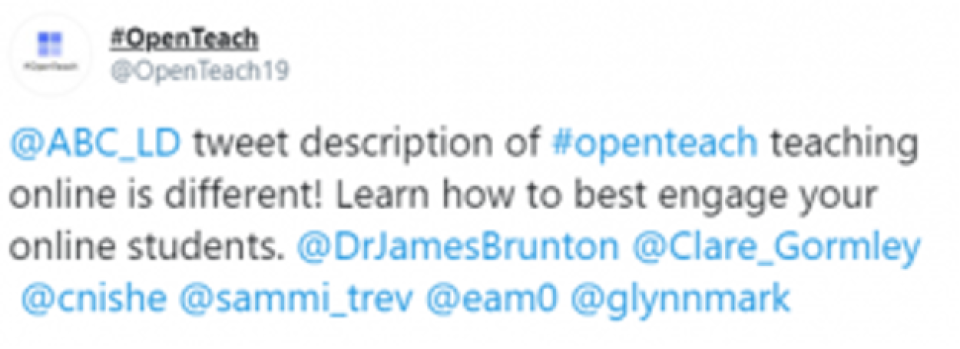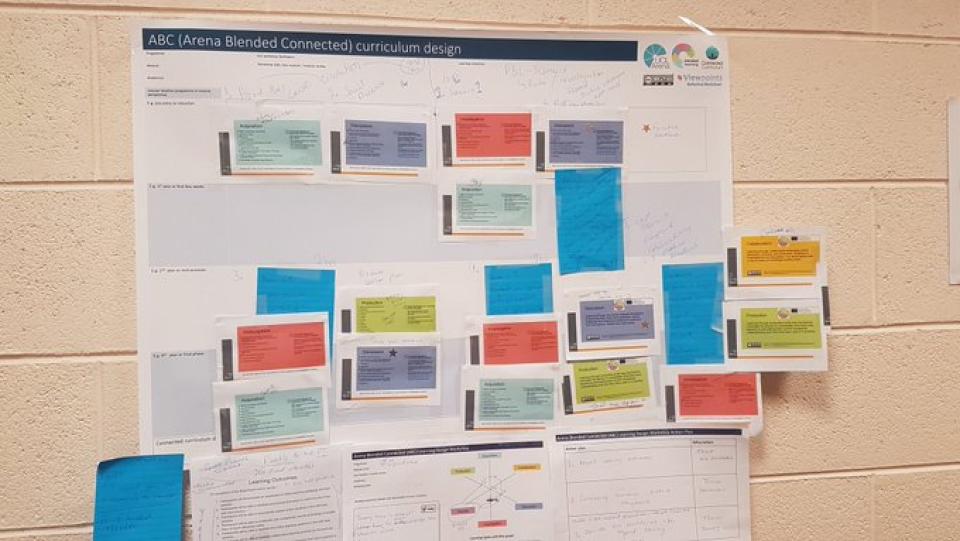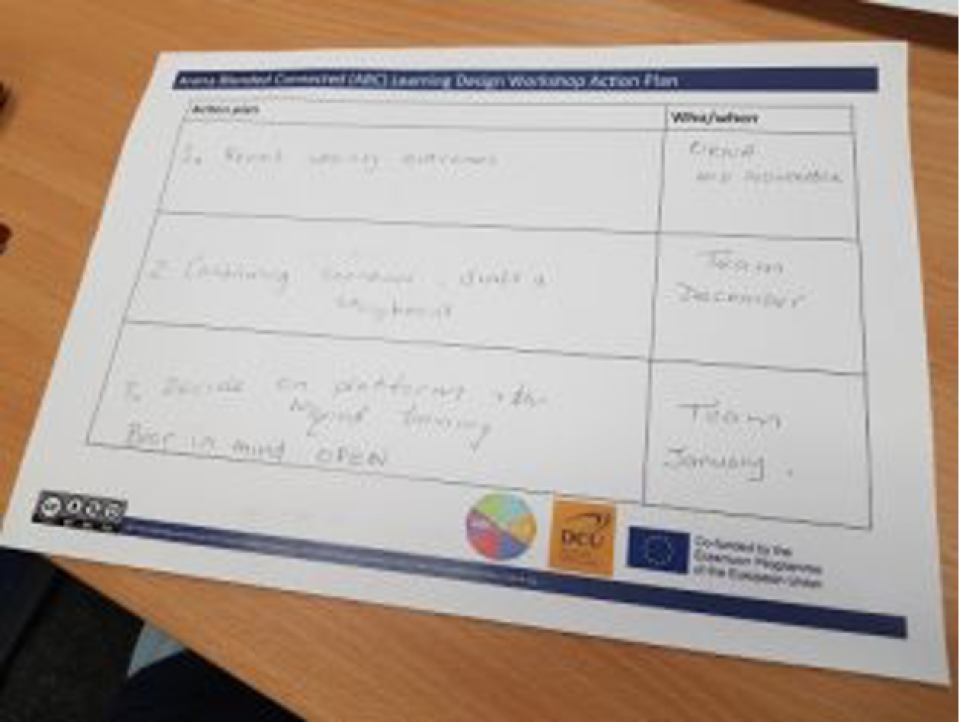The layout of the course was easy to follow, it was very well laid out.

Using ABC to Design an Online Teaching Course for Open Online Educators
|
Institution: |
Dublin City University (DCU), Erasmus+ ABC to VLE project partner |
|
Description: |
How the ABC Learning Design Framework was used to design the #OpenTeach Professional Development course for Open Online Educators |
|
Authors: |
Caitríona Ní Shé, Dr Orna Farrell, Dr James Bruton, Dr Eamon Costello, Samantha Trevaskis, Dr Enda Donlon, Sinéad Eccles The Teaching Enhancement Unit team for this case study includes Dr Mark Glynn, Head of DCU Teaching Enhancement Unit and Clare Gormley, Academic Developer. |
|
Date: |
30 April 2020 |
|
Course Details: |
Fully online CPD course run over two weeks, 450 participating educators |
|
Course goals/learning outcomes: |
|
“We had some ideas about the type of course we wanted to design in relation to the #Openteach project but we intended this workshop to be the facilitator of discussing and choosing a specific course design. The workshop was ideal for this and we did emerge with a course design upon which to build.”
Context of change
The #OpenTeach course was developed within the context of the #Openteach project funded by the National Forum for the Enhancement of Teaching and Learning in Higher Education. The #Openteach project aims to generate new knowledge about effective online teaching practice and to harness this new knowledge to support the professional development of online teachers and to more effectively support online student learning experiences. The Openteach project is based in the Open Education Unit (OEU), at Dublin City University (DCU).
This course was developed with the aim of addressing a gap in the provision of professional development for the OEU team of part-time online educators. These educators are generally employed on a part-time contract basis and provide academic support to students attending the OEU online programmes. The unit’s courses and programmes have moved from a distance education model to an almost fully online model over the last number of years. The online educators now deliver the vast majority of the content online, with a decreasing number of face-to-face tutorials each year. The OEU provides training sessions to the educators on the use of the institution’s platforms for online teaching. In addition, the online educators have access to many of the teaching and learning support activities provided by relevant departments within DCU.
Prior to the development of the course a review of the current literature in the area, and an analysis of the needs of online educators and students involved in the OEU programmes were completed. As a result, the #Openteach project team decided to focus the course on three main areas: social presence; online collaboration activities and supporting students. In addition, it is recommended in the literature that these types of courses are delivered online so that participants experience being an online student. The online educators are part-time, they expect to be able to complete the course in their own time and to select the course material most relevant to their needs. Thus a fully online ten hour asynchronous modular course was planned.
ABC workshop plan
The #Openteach project team had not been involved in the development of a course or a programme using the ABC curriculum design process previously, though they were familiar with the processes involved in learning design. Prior to the workshop the team were asked to prepare the learning outcomes of the course and share them amongst both the project team and the ABC facilitators. The ABC workshop was facilitated by Clare Gormley and Mark Glynn of the Teaching Enhancement Unit (TEU) on October 9th 2019, and followed the prescribed ABC format. Clare initially explained how ABC learning design fits in with DCU graduate attributes and the QQI standards. An overview of the ABC process followed and then Mark outlined the DCU localised version of the ABC learning type cards and the associated DCU ABC to VLE App Wheel. Then it was down to business.

#Openteach Tweet
First up was the #Openteach tweet, which was agreed upon within the given timeframe, only just!
ABC design
The hard work of designing the course followed the initial tweet. Using the learning outcomes and the outputs from our earlier work, the literature review and needs analysis, we already had a fair idea of the course structure. After a lengthy discussion, the team decided to use a scenario-based approach for the course. This meant investigative type activities were required. We agreed to use real-life online teaching dilemmas for each of the three main units of the course: social presence; online collaborative activities and supporting students. Once this initial decision was made it was easy to select the remaining learning types cards and associated activities. Key foci of the design were; to ensure the units were standalone, that the activities used in the course mirrored OEU online teaching practices, and that an effective overarching assessment for the course could be designed.
There were two main takeaways from the morning:

#OpenTeach Storyboard
The storyboard with the ABC learning type cards in place.

#OpenTeach Action Plan
And the action plan devised to complete the production of the course.
What was actually done
During the workshop It became apparent that the learning outcomes required editing in order to focus on the three main areas identified in the literature review stage, and to limit the course to 10 hours. Once the learning outcomes were finalised the next stage was the development of the scenarios and associated storyboards. The three dilemmas of Eimear, Míchéal and Áine were developed, corresponding to the ABC investigation learning types. At the same time the remaining learning type cards selected during the ABC workshop were consulted and a set of learning materials and activities were sourced and developed. A series of pdf take away documents was produced and made available as course materials. In addition, a number of collaborative and discussion type activities were designed to consolidate the participant responses to the three dilemmas. Finally, links to other online sources of best practice in online teaching were sourced and compiled. It was during this final stage that the value of the ABC to VLE wheel became apparent. A collection of recognised tools that support the different learning types were compiled as a set of ‘Tools that you might use’ for each of the course’s three units. For example, LinkedIN, Skype and Slack were recommended based on the Discussion type ABC to VLE wheel.
The next step was to build the course using the platform of choice, H5P embedded in DCU’s Loop (Moodle) platform. These course materials are standalone and can be packed as SCORM objects and made available as open education resources.
What support was required/provided
The support during the workshop was excellent. It provided us with the template to design and develop the activities. We were all delighted and amazed with the amount of work that we managed to complete during the morning as we came a long way towards a realisation of the #Openteach course. The two workshop outputs provided a basis for subsequent referral to decisions that had been made during the workshop. The slides ensured we had a reference back to the operationalisation of the learning type activities. During the subsequent development phase we consulted with the TEU team with respect to the ‘ABC to VLE App Wheel’ wheel in order to embed it in our course.
Impact and evaluation
The #Openteach course was required to meet the professional development needs of online educators in higher education. The aim was to equip these educators with the skills to facilitate effective online teaching. The decision to use scenarios as an investigative activity came about as a result of the ABC workshop. The release of the course accidently coincided with the COVID 19 pandemic. The numbers signed up to the course rocketed in a matter of days. Feedback from the participants indicated the course impacted greatly on their confidence going forward, in what was for many of the participants their first time teaching online
“I had no knowledge of online teaching beforehand and I feel I could teach online with my learners now. I have small groups and individuals so I would be comfortable working online with them now.”
“I am currently teaching online full-time due to Covid-19 and this course was perfect timing for me. “
A number of decisions were taken during the ABC workshop and a selection of student comments below relate to these designs.
The scenarios made me look at online learning environments in a different light recognising the advantages but also the pitfalls of technology if both parties are not sure how to use the tools.
I liked working on the dilemmas. It made me really reflect on what I was learning and put it in practice.
It was great to read the discussion forums and hear other people’s thoughts on the dilemmas.
The other thing I found useful was the numerous references to technology apps – I thought there were lots of practical tools.
Successes and lessons learnt
The #Openteach team found the use of the ABC learning design method successful in the scoping and designing of the course. The initial focus on the learning outcomes served to ensure the project scope was maintained throughout the subsequent design and development phases. The ABC process facilitated creativity amongst the team as we collaborated on the initial design of activities for the course. The use of the learning type cards was effective in subsequent stages of the design, it ensured the activities and resources developed for the course supported participants in achieving the learning outcomes. The design produced during the workshop meant that the course development could be completed by individuals in the knowledge that a common understanding of the course design had been achieved within the team.
Lessons learnt: Time spent on the design and redesign of a course can be saved by having the course team involved in the initial ABC design phase as a common understanding of the overall course design can be achieved. The ABC learning design process ensures that the subsequent implementation of that design supports participants in achieving the desired learning outcomes.
Scalability and transferability
The ABC method proved effective in this instance and the team agree that it can, and should be used in the OEU for future redesign of courses. The #Openteach project team is well defined, and perhaps smaller than a team typically involved in a programme. Coordinating activity and agreement amongst a larger group may prove more challenging and hence require further facilitated workshops from the Teaching Enhancement Unit.
Further information
References
Ní Shé, C., Farrell, O., Brunton, J., Costello, E., Donlon, E., Trevaskis, S., Eccles, S. (2019). Teaching online is different: critical perspectives from the literature. Dublin: Dublin City University. Doi: 10.5281/zenodo.3479402
Farrell, O., Brunton, J., Costello, E., Donlon, E., Trevaskis, S., Eccles, S., Ní Shé, C. (2019). An investigation of effective online teaching: a needs analysis of online educators and online students. Dublin: #Openteach Project.

Copyright
You are free to share and/or adapt this material in any medium or format, but you must give appropriate credit, provide a link to the license, and indicate if changes were made. You may do so in any reasonable manner, but not in any way that suggests the licensor endorses you or your use. You may not use the material for commercial purposes.
